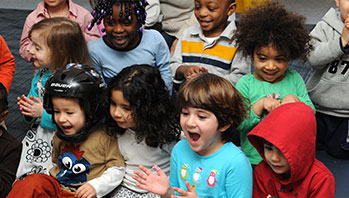MA Standards:
Speaking and Listening:SL.PK.MA.1a Observe and use appropriate ways of interacting in a group (e.g., taking turns in talking, listening to peers, waiting to speak until another person is finished talking, asking questions and waiting for an answer, gaining the floor in appropriate ways).
Head Start Outcomes:
Social Emotional Development/Self-Regulation Follows simple rules, routines, and directions.
Language Development/Receptive Language Attends to language during conversations, songs, stories, or other learning experiences.
PreK Learning Guidelines:
English Language Arts/Language 1 Observe and use appropriate ways of interacting in a group (taking turns in talking; listening to peers; waiting until someone is finished; asking questions and waiting for an answer; gaining the floor in appropriate ways).
English Language Arts/Reading and Literature 12 Listen to, recite, sing, and dramatize a variety of age-appropriate literature.
Greeting Song: “The Name Game” #2

© Commonwealth of Massachusetts, Department of Early Education and Care (Jennifer Waddell photographer). All rights reserved.
STEM Key Concepts: Sounds vary in three ways: volume (loud or soft), pitch (high or low), and timbre (quality)
ELA Focus Skills: Phonological Awareness (Rhythm, Rhyme, and Repetition)
Tell children they are going to sing a verse of “The Name Game” song for each child in the group.
Hold up children’s name card as you sing the verse with their name. Tell children you want them to join you as you repeat the verse. Have children alternate singing the verses in high, then low voices. Before each verse say, Now let’s sing the song in a high/low voice!
The Name Game
Holly, Holly, bo-bolly
Banana-fana fo-folly
Fee-fi-mo-molly
Holly!
Follow this pattern to create a verse for each child:
<Name>, <Name>, bo-b <name without first consonant sound>
Banana-fana fo-f <name without first consonant sound>
Fee-fi-mo-m <name without first consonant sound>
<Name!>
Social Emotional Tip: Encouraging children to manipulate their voices helps children in recognizing and regulating their self-expression.
